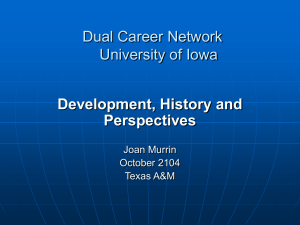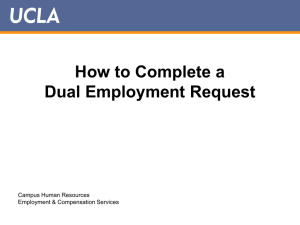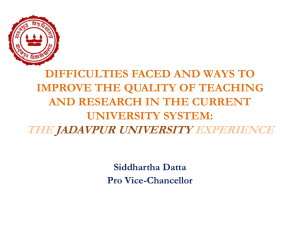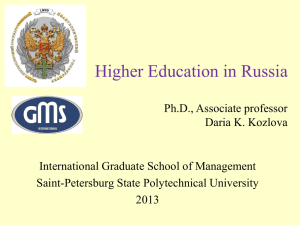Military research at universities
advertisement
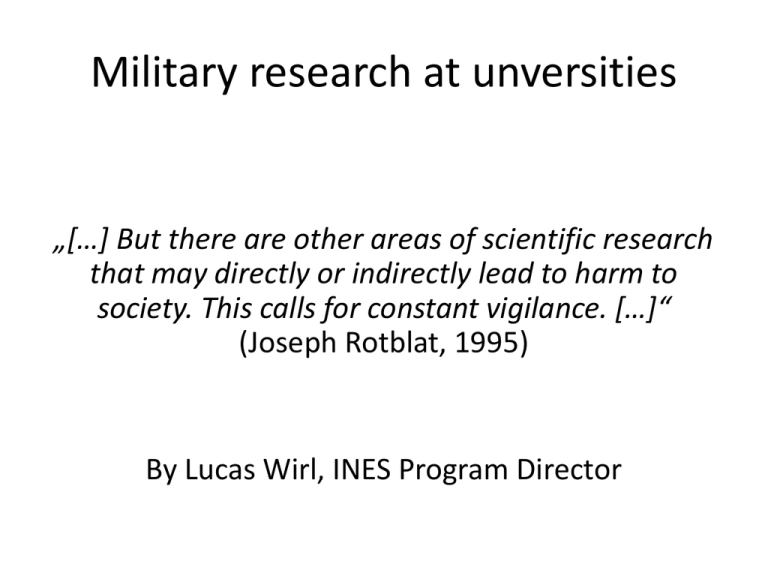
Military research at unversities „[…] But there are other areas of scientific research that may directly or indirectly lead to harm to society. This calls for constant vigilance. […]“ (Joseph Rotblat, 1995) By Lucas Wirl, INES Program Director What are we talking about? 1.1-1.5 mill. people work in the armament research sector 100 – 120 bill. USD for Research & Development per year , of which 25 bill. USD go to the „public sector“ (Germany: 5-7 bill. € per year) 90% of expenditure in developed countries; 2/3 USA and Russia 61% of all US research projects serve military purposes (dual use) Source: Partly SIPRI Report (2008/09), BICC Report (2010/11) Where is armament research conducted? a) Industry research b) Research areas and universities associated with the military c) Governmental research labatories d) Public institutions Two basic characteristics of research: Pure military research with spin-off Dual use – research signifies civil-military ambivalence Defense S&T and US Universities • Basic, applied research, and advanced development together form the defense S&T • The basic research – about $1.4 billion a year – significant for universities • DoD supports most engineering research at universities: • Electrical Engineering 72% • Mechanical Engineering 75% • Metallurgy and Materials Science 35% • Math and Computer Science 15% Source: DoD Basic Research Plan, February 2005, p.IV-3 Pentagon funds most R&D in the US Military research at German Universities (2009) 6 Examples: military research at German universitites Research cooperation between the University of Kassel and the Kassel armament enterprises Maffei-Wegmann and Rheinmetall Defense. Research contract of the European Defense Agency for „cognitive“ unmanned fighting machines. Aim of this research is to minimize loss among one own‘s soldiers and to weaken war resistance. The University of Freiburg is promoting the Freiburg weapons company LITEF and is receiving sponsoring money in return. LITEF is part of the US company Northrop Grumman and arms the surveillance aircraft Tornado ECR. At the University of Karlsruhe, the military research program „Cognitive Radio“ was revealed. This is a computer-based broadband communication system for multinational intervention forces and for „cognitive“ unmanned ground vehicles. From 2001 – 2004 funding for military medical research at the University of Duesseldorf. Bremen: OHB-funded professorship in Space technologies The Free University Berlin hosts the collaborative research center 700: on behalf of the Federal Ministry of Defense, this research center created a study on Afghanistan, since particularly Afghanistan is seen as „space of limited statehood“. Collaborative Research Center 700 at Free University Berlin On behalf of the Federal Ministry of Defense, the research center conducts a study with the task to identify „how and under what conditions governance services are provided in areas of power, safety and welfare in areas of limited statehood, and what problems arise there“ Security research EU program (2007), 1.4 bil. €, German Federal Government 123 mill. € Linkage of internal and external security; militarization of society Not only directed against other states or revolts, but also directed against terrorist attacks, natural desasters, flow of refugees, internal upheavals, protests Dual use, networked security, comprehensive security approach Ambivalence of science and research „dual use“ – objects, technologies and knowledge that are usually serve civilian purposes, but can also be used for military purposes. A dual use is technically feasible and politically desired. Examples: • High energy physics: nuclear energy • aerospace • Satellite • Genetic Engineering • Neurological networks • Information processing systems Criteria for identifying dual use research • Confidentiality and no publication • Financing • Discourse about their own actions: ethics and responsibility Wolfgang Borchert (1921-1947) „You researchers in the laboratory, If tomorrow they tell, You shall invent a new death Against the old life, Then there is only one choice: say NO!“ Early warning systems and alternatives a. b. c. d. e. f. g. h. Civil control Have a say Transparency of funding Openness and freedom to publish studies Cricical public voice Individual responsibility Peace research, Sustainable Science Personal engagement in a peace organization i. Societal Verification, Whistleblowing j. k. Public awareness Conversion l. Civil Clause personal & structural responsibility Civil Clause Definition: A clause in the legal system is a well-defined single provision in contracts or laws, which consists of a condition or option. In the present case, the clause deals with the statutory requirement that research is to be conducted for exclusively peaceful (civilian) purposes and, consequently, excludes military or civil-military (dual use) research. Initiative „Universities for Peace – Yes to Civil Clause “I would rather have me beat to pieces than participate in such a miserable doing.“ Albert Einstein Actions for Civil Clause • Decentralized work – Public debate /events / actions – Engagement of (political) stake holders • Conference „no to military research …“ • Weeks of action – At ~20 universities – Engagement of students and public • Conference in Karlsruhe, 15./16.6.2012 • Conference in Spring 2014: 1914-2014: Militarism, Science, and universities 12 Civil Clauses in Germany • Technical University Berlin, University of Bremen, University of Oldenburg, Technical University Dortmund, University of Tübingen, University of Rostock, Technical University of Ilmenau, Instituion of Higher Education Bremerhaven , University of Konstanz, Technical University of Darmstadt, University of Frankfurt, University of Göttingen 16 „Bringing Civil Clauses to Life“ Engagement in: •Peace Research, Sustainable Science, Conversion, People‘s Science, Conversion •Democratic, participative, transparent structures •De-colonization of science from the logic of valorization / markets •Societal verification / whistleblowing „Inventive […] dwarfs, who can be rented for everything.” Bertholt Brecht, The Life of Galilei Thank you for listening! More information on www.inesglobal.com



